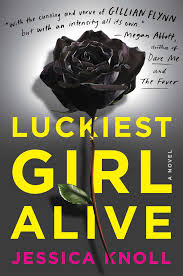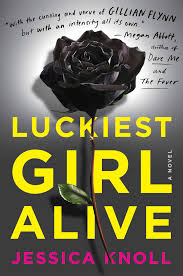Luckiest Girl Alive



I first saw Luckiest Girl Alive on Reese Witherspoon’s Instagram feed, and I knew that she was obviously going to buy the book’s film rights – would she be promoting it otherwise? Tracy Flick knows what she’s doing.
So when I found myself on a 5-hour flight, I knew that was the book I wanted to read, because Reese’s acquisition skills have been pretty solid: Gone Girl and Wild, so far, with Big Little Lies to come (with Nicole Kidman).
Luckiest Girl Alive didn’t disappoint. I won’t give anything away here, but if you are adamant about not knowing anything when you go in, here’s a perfunctory spoiler alert warning.
The protagonist in LGA, TifAni FaNelli (yes, that’s how it is spelled) is successful and engaged to a handsome WASP with just the right amount of family money and prestigious last name. TifAni has spent almost her entire life trying to “rise about her raisin’” and escape her banal middle classness, her clueless and materialistic mother, her tacky first name and the vowel at the end of her last name. Her status-obsessed mother’s cherry red BMW and French tips make it clear that TifAni’s mom is the worst kind of has-not, the kind that doesn’t know it and mistakes Coach for Celine.
But it’s not just a lackluster pedigree that TifAni has to overcome, it’s a capital T Tragedy that is both her albatross and her way out of a life spent not on the wrong side of the tracks, but just a little past the last station (literally).
Author Jessica Knoll (a first book bitch, for sure) weaves in elements of teen fiction, true crime, chick lit – there’s a prestigious private school and a “perfect” fiance, but everything is just the right amount of off. It’s not supposed to feel good. When you smirk while reading about the pleasure Ani takes in petty slights or identify with her calculated social interactions, it’s not exactly heartwarming.
TifAni /Ani is a writer at a women’s magazine and, having myself written for many magazines, the descriptions of pitch meetings and Rag & Bone booties and the labyrinth of rules (you can get a blowout or get your make-up done for an event, but doing both is desperate) is spot on. TifAni, reinvented post-college as just Ani, is constantly trying to figure out the unwritten rules and each time her pedigree leaves her unprepared that kind of life, it makes her more anxious and determined to fit in.
As a teenager, Ani attends a prestigious private school and is exposed to cruel new money and entitled old money. No expensive car can make up for the fact that your parents didn’t teach you to pass the salt and pepper together. As she grows up, she learns to use things like her engagement ring as a WASP armour, and it’s an interesting look into how tempered materialism is the real status symbol.
There are several hints about what happened to Ani – it’s not impossible to guess. Once Ani’s character is well established, a smart and disciplined move by the author, the Tragedy is revealed.
Teenage TifAni and adult Ani are both self-absorbed, self-serving and manipulative. And therein lies the brilliance of the book. Teenagers are assholes and TifAni is an asshole before, during, and after the Tragedy. Martyrdom doesn’t wipe away her personality, but it also doesn’t make her less of a survivor. She is a survivor, as well as a victim, a scapegoat, an opportunist, a shallow brat and a fairweather friend. She’s bullied (and worse, but spoilers) and ostracized and desperate to be more accepted.
TifAni grows up and perfects her poker face, but she never loses that desperation. Instead of tragedy transforming her into a grateful and poised hero, it makes her more calculating and vicious. The stakes get higher as she grow up – first she needs the right seat in the cafeteria, then she needs to get into the proper college, then she needs to land the right job, the perfect boyfriend… the Tragedy alters her course, but it doesn’t negate all the things that TifAni wants. It makes her want them more. And that unabashed ambition that she’s forced to disguise is constantly bubbling up and threatening her fragile privilege.
The idea of “effortless” – a theme magazines love to expound on (Effortless style! Effortless beach waves! Effortless dinner parties!) – takes up a lot of Ani’s mental space. The effortlessness takes so much effort. Her narcissism is exhausting but justified considering her life experience; she has a third eye, but she only uses it to watch herself and adjust her external tics to get the things she wants.
Most of what I’ve read about Luckiest Girl Alive focuses on plot points and surprises and yes, there are some good twists and turns. But for me, it was Ani I couldn’t get enough of, because she was ugly and aspirational and cruel and sad. At points, I wondered if she was a borderline sociopath. I’m still not sure. I liked Luckiest Girl Alive more for it.
Read it so we can start casting the movie.

